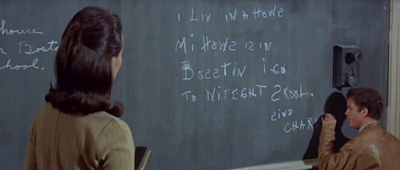Format: DVD from NetFlix on The New Portable.

Charly seemed very familiar to me. I realized at some point while watching that I’d seen part of this before. I’m pretty certain I hadn’t seen the whole thing, but there are a couple of moments that were shockingly familiar to me. If I have seen the whole thing previously, it was so long ago that this was not unlike a first viewing of the film. There are a lot of odd things about Charly and its Oscar journey. Cliff Robertson won this Oscar in what would be his only nomination and the only one for the film. It’s also an odd nomination in the sense that this is at least nominally a science fiction story, and Oscar tends not to like that genre for acting nominations.
Charly Gordon (Cliff Robertson) is an intellectually disabled man who wants to be smarter. While it’s never overtly stated in the film, it is implied that Charly’s deficiencies stem from a childhood illness that involved a very high fever. However, he is high enough functioning that he lives in his own room at something like a boarding house and has a job at a local industrial bakery. He also attends night classes with Ms. Alice Kinnian (Claire Bloom), where he works hard but struggles even with basics like writing his own name.
In an effort to help Charly and advance science, Alice takes Charly to a clinic run by doctors Richard Nemur (Leon Janney) and Anna Straus (Lilia Skala), who have been working on surgically augmenting the intelligence of laboratory mice. Nemur and Straus have been looking for a human test subject, and Charly, mostly because of his dedication and work ethic, is soon a candidate. This process starts by pitting Charly against a mouse named Algernon in races of solving mazes. Algernon regularly beats him.
This wouldn’t be much of a movie if Charly didn’t get the surgery, so naturally he’s going to be the one who gets the surgery despite the significant drawbacks to choosing him for the surgery. And while it takes some time, eventually Charly starts to beat Algernon at the maze. And then his intellect begins to take off at a much more significant pace. While Alice tutors him, Charly is soon outpacing her lessons and becoming more and more knowledgeable of the world around him. One of those things he begins to understand is that his coworkers at the bakery are not really his friends. They treat him poorly regularly, often playing jokes on him without him really being aware that he is being made fun of. That’s taken to its ultimate conclusion when Charly, getting smarter, no longer falls for their pranks and he is summarily fired when his coworkers sign a petition to have him removed.
While Dr. Nemur seems to stress intellectual development, Dr. Straus’s field is more in the realm of emotional development. Her worry is that Charly is advancing too quickly intellectually without a corresponding gain in his emotional development. This proves to be an issue when it becomes clear that Charly has feelings for Alice Kinnian that are not immediately reciprocated. This leads to a sort of low-grade sexual assault that in 1968 terms would be seen as pretty harmless. It also doesn’t prevent Alice from eventually requiting those feelings for Charly. Eventually, as you pretty much knew would happen at some point, Charly and Alice become a couple, her engagement to another man long forgotten
I won’t spoil the film or go much into the third act here. Suffice to say that we’re not going to get a happy ending out of all of this, at least from one way of looking at what happens. The reasons for these seem to suffer from the same sort of scientific mumbo-jumbo as Charly’s rapid mental advancement does. And that advancement is significant. It’s never said overtly, but it’s made pretty clear in several instances that, thanks to the treatment he has received, Charly becomes a leading intellect in just about every field in which he shows an interest.
I’ll be blunt here: Charly isn’t a bad movie, but thre are parts of it that I think are really unnecessary. I realize that this is based on a short story that was turned into a novel, and I also realize that there’s a part of Hollywood that feels like a romance is always necessary in every story, but it feels so…inappropriate in this one. Charly’s feelings for Alice Kinnian are natural, given the situation. She’s long been his teacher and as his intellect grows, it’s natural that he would attached to her in some way. But for her to fall for him in that way is at the very least damn strange on two levels. First, he does basically sexually assault her, and that’s just washed away. Second, and significantly, he’s been essentially a child to her. It’s the sort of relationship that would feel horribly predatory with the genders reversed.
So let’s talk about Cliff Robertson, who won an Oscar for his portrayal of Charly Gordon. I think he does everything he can. He’s clearly more comfortable in the latter half of the film when the operation has taken place and Charly is of normal and then super-normal intelligence. Early on, Robertson’s portrayal of the intellectually deficient Charly is as compassionate as it can be, I think. Robertson plays Charly seriously and not as a joke, and that certainly helps. It does help fuel that stereotype that Oscar rewards actors (males specifically) with roles that involve physical or mental handicaps.
Why to watch Charly: There are moral issues here that are fascinating.
Why not to watch: It’s unnecessarily artsy at times and did we really need a hero that engages in sexual assault?
